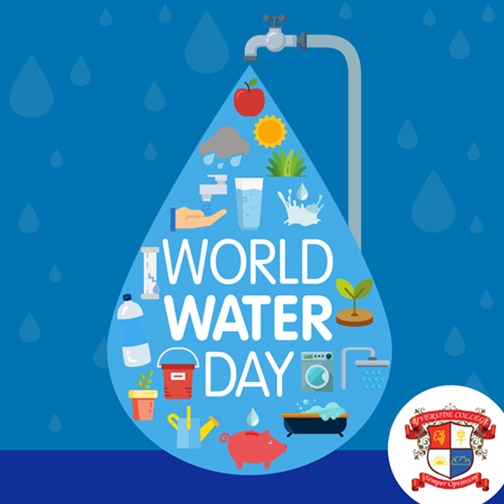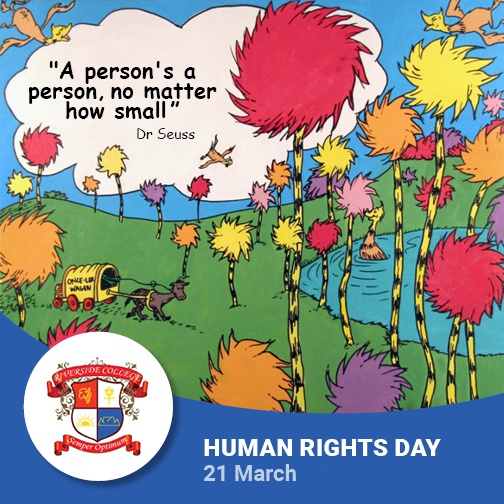Author: elana
World Water Day
What are you doing to save water? #WorldWaterDay #AvoidDayZero
Human Rights Day
Children’s rights are human rights #ProtectOurChildren
Primary school Valentine’s Day dance
Grade 4 to school camp
Grade 7 to 12 school camp
Riverside College prize giving
School athletics
This festive season teach your kids some gratitude
Schools have broken up for the holidays and the countdown to Christmas has begun. For many, this can mean too many presents and not enough gratitude. These holidays, try cutting back on the materialism and encourage your kids to embrace the true meaning and spirit of the festive season instead.
“Teaching your kids to say thank you and be grateful for what they have is important, especially over this time,” says Riverside College’s primary school vice principal Madelein Luttig. “Kids can get wrapped up in the gift giving and receiving frenzy and forget that Christmas is actually a time for appreciation, reflection and giving back.”
Parents need to make a consistent effort to encourage gratefulness in all aspects of their child’s lives; “Not only for material things, but also for the experiences they have and the people around them,” says Luttig.
Teach your kids some gratitude this festive season in five easy steps:
- Lead by example – Make an effort, especially during the festive season to verbalise throughout the day the things that you are grateful for – you’ll be amazed the knock-on effect this will have on your kids.
- Volunteer – Encourage your kids to do something for someone in need. Getting out there and actually doing something for someone else is a great way to teach kids gratitude (as well as compassion and empathy). Visit forgood.co.za to connect to an organisation looking for your help.
- Get the kids involved – Give your kids tasks to do over the holidays. Getting them to pitch in on all the holiday preparations, such as cooking, and cleaning will help them to appreciate what they have and all the work that goes into it.
- Write thank you notes – This is especially important over the festive season. Get your kids to write thank you notes for any gifts they receive or special experiences they are treated to. Make a special time to sit down and write these – they don’t have to be long, but allow them to do it on their own so they can really think about what they would like to say.
- Make gratitude a family event – Go around the dinner table each night taking turns to say one thing, person or experience that they are grateful for that day. As kids get older, encourage them to keep a daily gratitude journal. Being intentional about gratitude is a daily reminder about how lucky we are.
Teaching children to be kind is essential
The impact of kindness is felt by both the person giving and receiving it – and the effects of this can be extremely beneficial. Teaching children to be kind from a young age is a vital part of their development, positively impacting their lives at school, at home and well into their adult lives too. In recognition of World Kindness Day, which takes place on 13 November, Riverside College has launched The Kindness Project – a social experiment running for the month of November, demonstrating the positive impact that kindness can have.
For the experiment, two seeds have been planted and placed in different parts of the school. Learners have been encouraged to be kind to one of the plants – to talk to, sing to or just sit with it, while ignoring the other. At the end of the month, the school will look to see which plant has grown better.
“In a world run by social media and adults that aren’t always the best role models, it is vital that children are taught the importance of kindness,” says Riverside’s primary school vice principal Madelein Luttig. “The kindness experiment shows the impact that kindness can have on those around you in an easy to understand and tangible way.”
Children that are kind to others very quickly learn that making others feel good also makes them happy. Even small acts of kindness create feelings of self-worth and belonging. Other benefits include greater concentration in the classroom, less bullying, less stress for both teacher and learner, and more time – when children are getting along, they’re able to work together in a calm and sensible way which means you can spend more time teaching and less time on discipline.
“One of the best things we can do as teachers and parents is to find opportunities to extend kindness, teaching learners to do the same. When our learners are kind to one another, classrooms are filled with happier and more confident children. Creating this kind of environment has a very positive effect on their willingness to learn.”
Does being kind to plants help them grow?
The Kindness Project – experiment
What you need:
- 2 x small jars
- 2 x seeds (soaked overnight)
- Cotton wool
- Water
- Permanent marker
What to do:
- Label one of the jars ‘be kind to me’ and leave the other one unlabelled
- Wet the cotton wool lightly and place into the jar
- Place the seed inside the cotton wool
- Place each plant in two different spots in the classroom (this is important)
- Make sure the cotton wool is always slightly damp (but do not over water)
Now for the experiment:
- Every day show kindness to the plant that is labelled
- Completely ignore the unlabelled plant (other than giving it water)
- At the end of the month – ask these questions:
- Which plant has grown more?
- Has being kind to your plant helped it to grow better?
- What have you learnt from this experiment?



